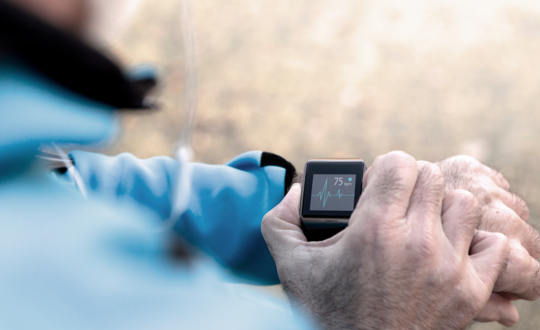Wellness Wearables and Big Data
Jul 01 2020
Nearly half of Americans have tried wellness wearables or another digital health product. In a global pandemic, can we use the information tracked by wellness wearables to help prevent further spread and infection?
Wellness wearables are small electronic devices that can help measure blood pressure, temperature, blood oxygen, GPS location, physical activity levels, changes in direction, elevation, and the electrical activity of the heart, muscles, brain, and skin. The tracking data can keep chronic diseases such as diabetes, hypertension, and high cholesterol in check by enabling the wearer to make healthier diet and lifestyle choices. But how can we realize the full potential of this data? Since the spread of avian influenza over a decade ago, use of automated data streams to rapidly detect and track influenza cases has increased.
An innovative study by Radin and colleagues (2020) is the first to use wearable device (Fitbit) data to evaluate whether that data could improve influenza surveillance at the state level. Wearables that continuously track measurements such as resting heart rate, activity, and sleep might be able to identify physiological responses to acute infection, such as an elevated resting heart rate. Sleep and activity are also likely to differ from the norm when someone is ill. Traditional influenza surveillance relies on a combination of virologic and influenza-like illness symptoms to estimate trends. It has a reporting lag, and is often revised later by the CDC. Nowcasting studies have attempted to use crowd-sourced data such as Twitter to provide real-time influenza surveillance. Radin’s focus was on an additional method of “nowcasting”.
Radin and colleagues obtained de-identified sensor data from 200,000 US individuals who used a Fitbit from 2016 to 2018. They identified 47,249 users in the five states with the most Fitbit users in the data set; this included more than 13.3 million total resting heart rate and sleep measurements. The authors developed short-term prediction models using the data and found that it significantly improved influenza-like illness predictions in all five states. Week-to-week changes in the proportion of Fitbit users with abnormal data were associated with week-to-week changes in influenza-like illness rates. The authors conclude that in the future, with access to real-time data from these devices, it might be possible to identify influenza-like illness rates on a daily basis. Thus, we could use almost real-time data to enact response measures to prevent further transmission of influenza.
All Fitbit users, including those whose data were used in the study, were notified that their de-identified data could potentially be used for research via the Fitbit Privacy Policy. If we were to use this data in real-time, it is akin to contact tracing — identifying all the recent interactions of sick individuals to determine whom they might have infected. Tracing seems to work in terms of reducing COVID-19 deaths, but as we have learned from countries in Europe and Asia, contact tracing has violated people’s privacy and put people at risk including by continuously uploading people’s location. It is only anonymization that can create a useful public health program that also protects its participants.
It is anticipated that the large amount of real-time data from wellness wearables will continue to supplement traditional surveillance systems and prove useful for public health. The ever-expanding big data revolution offers unique opportunities to mine new data streams, identify epidemiologically relevant patterns and enrich personal health, if collected and maintained with the appropriate safeguards.
https://news.gallup.com/poll/269096/one-five-adults-health-apps-wearable-trackers.aspx
Radin JM, Wineinger NE, Topol EJ, Steinhubl SR. Harnessing wearable device data to improve state-level real-time surveillance of influenza-like illness in the USA: a population-based study. Lancet Digital Health. 2020. 2: e85–93.